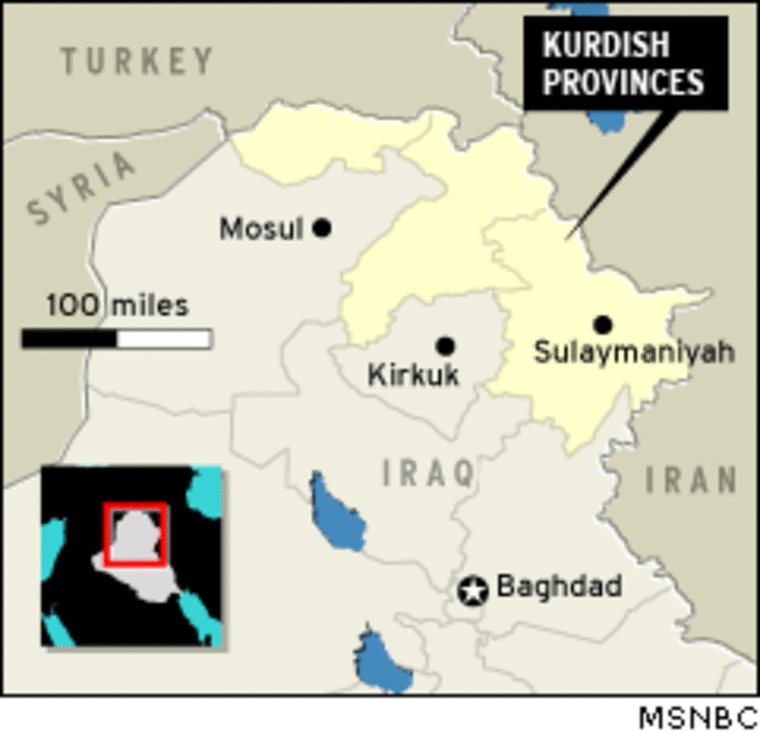Two years after American troops fought their way into Baghdad to chase Saddam Hussein from power, the Iraqi capital remains the most dangerous city on earth, where car bombers and killers have confined its conquerors to well-protected bases.
Iraq's security forces are unable to function without massive support from the U.S.-led coalition, and reconstruction efforts are making only limited progress.
For the vast majority of Iraqis the war hasn't worked.
But in the three autonomous provinces of Kurdistan in northern Iraq, it's a different story.
Here, under the protection of the American military for more than ten years, Kurds have built a haven of peace and prosperity which, thanks to political maturity learned at the feet of American development agencies, now controls 75 seats in the new Iraqi parliament and leaves Kurds poised as kingmakers in negotiations to form a national government.
Bustle in Sulaymaniyah
In the city of Sulaymaniyah, once a sleepy summer resort town nestled in the foothills of northern Iraq's border with Iran, construction crews now race to complete office blocks, hotels, and apartment complexes to handle an influx of investors anxious to cash in on Kurdish development.
Its population has mushroomed to more than half a million, including many Iraqis who have fled north to escape the violence paralyzing their country and drawn here by security and economic opportunity.
Increasing numbers of Kurds are returning here from aboard. In the bustling souk of Sulaymaniyah we met Jabbar Mohammad, a student from Washington D.C., who was home to visit family for the first time in seven years.

"My dreams have come true," said Mohammad. "I wanted to have a free country, not to be killed, not to be hit by biological bombs and not to be hurt by enemies around us."
Was he surprised by the development projects around him, the cell phones, the Internet cafes, the souk bursting with goods?
"I'm really surprised. I can't believe it. It's really different and I'm sure in another eight or 10 years from now, it will be better and better."
Peaceful mix in Kirkuk
The pride and optimism Kurds feel in their achievement has rekindled their desire to resettle in Kirkuk, the capital of the neighboring Tamim province.
Saddam's Baath party chased Kurds out of Kirkuk in the 1980s, replacing them with Sunni Arabs from southern Iraq to work in the nearby oilfields. Now the Kurds want their homes back, and a share of the oil revenues.
But Kirkuk is a mixed city where Kurds share space, and jobs, with Sunni Arabs, Turkomen and Assyrian Christians.
The U.S. Army's 42nd Infantry Division patrols here not just to keep the peace, but to make sure returning Kurds do not displace Arabs or Turkomen and sow the seeds of violence.
"We are working very closely with both the Arabs and the Kurds to ensure that as the Kurds move back in they are resettled into positions and to places that are set aside for them, or into their old homes. And the Arabs are moved out, but resettled properly," said Maj. Darran Blackburn of the 42nd Division.
Vast oil resources equal power
But many of Kirkuk's Arabs, and many Kurds too, suspect the main concern of the U.S. army is to make sure violence doesn't disrupt plans to pump more oil from northern Iraq.
Kirkuk's underground deposits of nearly 10 billion barrels account for six percent of the world's known oil reserves.
Under Saddam Hussein they produced 60,000 barrels a day, but today their rusting and dilapidated infrastructure can barely manage to pump half that total. Pipelines leading north to Turkey and south to Baghdad are often sabotaged by insurgents.
The U.S. is helping to train Iraqi forces to prevent these attacks, but even optimists concede it could be many months before the pipelines are once again carrying capacity loads.
Many Iraqis, particularly Arab Sunni Muslims, suspect the Kurds plan one day to declare an independent state, although Kurdish leaders say neighboring governments in Iran, Turkey and Syria would never allow it for fear of encouraging independence among their own Kurdish populations.
Nevertheless, too much autonomy for Iraqi Kurds might prompt Iraq's Shia to demand the same, perhaps even resorting to war for control of southern Iraq's oilfields around Basra, leaving the once-dominant Sunni Muslims in the middle with no natural resources to support themselves.
While Iraqis envy and resent the Kurds for the support and protection they've received from the U.S. for more than 10 years, they now fear their political power as swing voters in the new Iraqi parliament.
That’s the difficult challenge facing Iraqi leaders – how to give the Kurds enough autonomy to keep them happy without provoking rival Sunni and Shiite Arabs into fighting for their own share of Iraq’s resources and threatening the country’s fragile unity.
